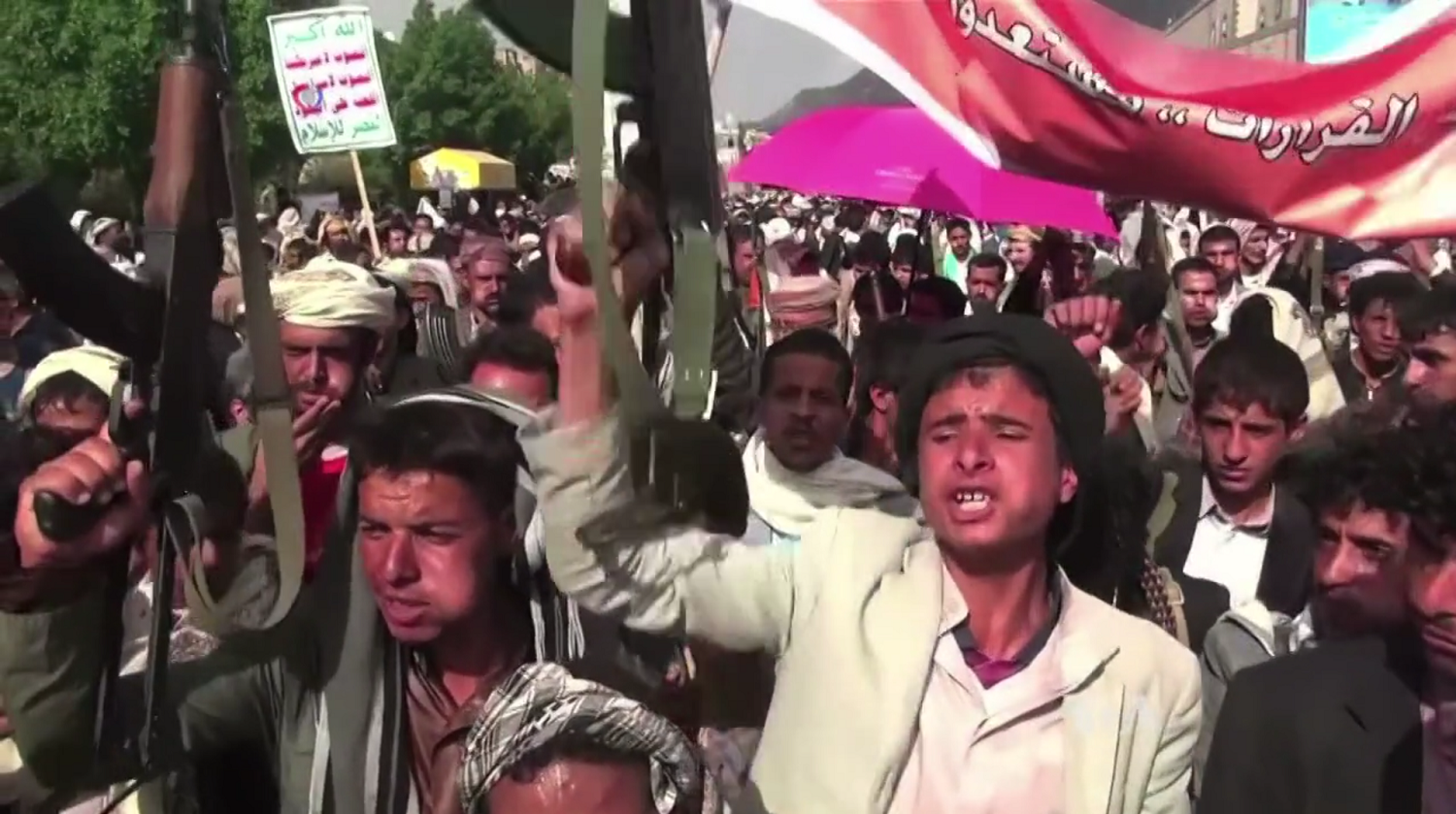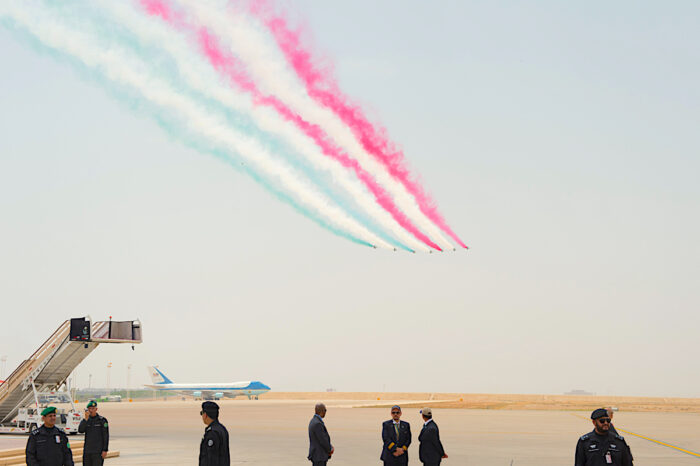In his new book about the Saudi crown prince, Ben Hubbard does not deviate one bit from the conventional wisdom of Western reporters, writes As`ad AbuKhalil.
By As`ad AbuKhalil
Special to Consortium News
 Western governments and media have been fascinated with Muhammad bin Salman ever since his father, the ruling king, elevated him to power and disregarded the traditional dynastic rules of succession. His youth made him an attractive object of analysis and high expectations among Western journalists and officials.
Western governments and media have been fascinated with Muhammad bin Salman ever since his father, the ruling king, elevated him to power and disregarded the traditional dynastic rules of succession. His youth made him an attractive object of analysis and high expectations among Western journalists and officials.
The more he deviated from contemporary Arab political rhetoric, especially about the Palestinian question (which he has ignored in Arabic and denigrated in English) the more admired he was in the Western press. Thomas Friedman, among others, was quick to rush to meet him and write laudatory articles about him in The New York Times. For Friedman, he epitomized the “Arab spring” — how can a period filled with wars and blood of innocent people be still characterized as a “spring?”
Ben Hubbard’s new book about MbS is supposed to provide readers with a portrait of a man about whom very little is known — in the Arab world or anywhere else. Hubbard is Beirut bureau chief for The New York Times and is one of the few Western correspondents fluent in Arabic. He has traveled extensively inside the kingdom and covered the rise of MbS for the Times.
But Hubbard does not deviate one bit from the conventional wisdom of Western reporters especially about the principles of U.S. empire, or about the blatant bias of U.S. media in favor of Israeli occupation and aggression. Here, in his book, it comes across clearly and frequently.
On Hizbullah he says that it “uses its clout to menace Israel”. (P. 178). Israel occupied South Lebanon from 1976 until 2000. It rarely stopped its regular incursions and bombing campaigns into Lebanon from the 1950s until 2000, and yet Hubbard believes that Hizbullah (which never existed before the Israeli invasion of 1982) is menacing Israel while Israel, which occupied Lebanon, presumably simply minded its own business as an occupying power. To him, Hizbullah is merely a militia intended to “threaten Israel” (p. 180). In other words, he accuses those who are occupied with threatening their occupier.
Those who resisted Israeli occupation in Lebanon over the years included communists, Arab nationalists, Syrian nationalists and Islamists. Hubbard would see them all as provocative forces “threatening and menacing Israel.” This bias sets the stage for the reader.
Not Much New
There is not much new in this account of MbS beyond what was already published in Western media, and what was written by Hubbard himself. The book merely adds details and flourishes, most of which were based on Saudi royal sources or Western and Middle East diplomatic sources. Shockingly, the author who can read Arabic did not bother with Arabic sources: his bibliography includes one book by a Saudi dissident (but it was published in English). 
Saudi opposition has been quite prolific in the production of material (some of which is scholarly) about the Saudi regime but Hubbard did not bother with it. In that, he does not differ from those Western journalists who don’t find the natives to be reliable. Worse, he cited a book on Saudi Arabia by one Sandra Mackey (who is not a Middle East expert). Sandra Mackey lived in Saudi Arabia in the 1980s while her husband was a physician in the kingdom. She would later publish the book, “The Saudis,” which was intended to be serialized for the National Inquirer. Her book is riddled with racist anecdotes and generalizations: she “reports” that Saudi men and women make love while keeping their clothes on (p. 154); that Saudi women drool as they eat (p. 193); and she asserts that “science has failed to penetrate the minds of Saudi men” (p.77). But for Hubbard, Mackey is a reliable informant on Saudi Arabia.
The book suffers from a variety of problems.
Firstly, the author fails to mention the prominence of Prince Salman, MbS’s father, (before his coronation) within the royal family (p. 20). Salman was always a senior member of the royal family, and he formed (since 1964, when Faisal became King) the Sudairi Seven ruling clique within the ruling family. And even within the Sudairi Seven, Salman was quite senior. Hubbard notes that Salman did not hold a powerful ministry but that does not mean his chances of becoming king were “remote” (p. 20). Being governor of Riyadh in the crucial years of the kingdom’s development was not a minor post — which he himself preferred. As a former US ambassador in Saudi Arabia once told me: Salman always carried himself like he was either the king or would be one some day.
Secondly, Hubbard’s account of the Saudi regime and of MbS is rather apologetic in various places. He maintains that MbS was determined to give the Saudis “a shining, prosperous future” (p. 13). But MbS, in what are referred to as “social reforms,” was largely acting at the behest of Western PR firms who advised him on ways to placate Western critics and to win favor among the Saudi youth.

Houthis protest airstrikes by the Saudi-led coalition on Sana’a, Yemen’s capital city, September 2015. (VOA/Henry Ridgwell, Wikimedia Commons)
Hubbard sees Saudi Arabia as a victim (p. 43) of Iran’s “export of revolution” (as the Western cliché goes) without noting that the Saudi regime worked to overthrow the Islamic regime from early on. Saudi royals were close allies of the Shah and they funded Saddam Hussein’s long war on Iran during the Iran-Iraq war. On Muhammad bin Natif (MbN), Hubbard claims that he was “hailed as a hero” inside the kingdom (p. 43). In fact, MbN (like his father Nayif) had a terrible reputation among the Saudi public because the Ministry of Interior was notorious for ruthless repression and torture. How Hubbard missed all that is rather odd; but then again, you get the impression from his writing that he talks only to royals, their entourage, and to Saudis who are approved by the royals.
Thirdly, on the longstanding tradition of Saudi government production of religious and political literature of bigotry and misogyny, Hubbard simply reports that he has not heard insults to Jews and Christians (although anti-Semitism still permeates Saudi school textbooks). Hubbard oddly dismisses Saudi state bigotry against Shiites because it is due to “ideological reasons and as part of the rivalry with Iran” (p. 62). Would Hubbard dare dismiss Arab state anti-Semitism as being for “ideological reasons and as part of the rivalry with Israel?” No, one should not dismiss either anti-Semitism nor anti-Shi`ism and it does not matter if it is motivated by this or that reason.

A flyover of military aircraft streaming red white during the welcome ceremony of President Donald Trump and First Lady Melania Trump on Saturday, May 20,2017, at King Khalid International Airport in Riyadh, Saudi Arabia. (Official White House Photo by Andrea Hanks)
Fourthly, Hubbard rightly points to the influential role Western consultancy and PR firms play in the government of MbS but his account of those firms is laughingly propagandistic. He tells us those Western consultants “valued punctuality, transparency, democracy, and open markets” (p. 74). It would be fair to say that Hubbard only got the last value right: they do care about open markets. Those Western companies (like McKinsey & Co.) are notorious for their opacity and secrecy; not transparency. And while it is true that the royals don’t operate on the standards of punctuality (although King Salman himself was famous for being punctual but Hubbard could not resist the Western Orientalist cliché about the natives), those Western companies don’t mind bending their rules and standards as long as they are making millions off those regimes. And the notion that those companies, which cater to brutal dictators and despots around the world, care about democracy shows you the level of Hubbard’s commitment to the Western political agenda and myths.
Fifthly, his account of Jamal Khashoggi is typical of Western lionization of the man. Here is Hubbard conceding that the man was close to the Saudi intelligence service, and that he worked basically as a propagandist for various Saudi princes, and yet he tells the reader that Khashoggi championed democracy. Where was that championing when his entire career was devoted to working for media or press offices of royals? Hubbard’s characterization of Khashoggi’s writings in Arabic leaves the reader with the certain impression that Hubbard never read those articles. He considers him a democratic journalist even when admitting he would do sympathetic interviews for a fee (he got paid $100,000 for a sympathetic interview with the prime minister of Malaysia) (p. 84). Hubbard is so hard at work in embellishing the record of Khashoggi that he describes the mouthpiece of Prince Khalid bin Sultan, the daily Al-Hayat (where Khashoggi wrote for years) as “an international Arabic newspaper based in London.” He did not seem keen on informing the reader of the type of journalism that Khashoggi practiced.
Sixthly, on the brutal war on Yemen, which created the largest humanitarian crisis in the world according to the UN, Hubbard fantastically claims that it was the Huthis and not the Saudi regime which started that war (p. 96), and he considers the U.S.-Saudi arrangement to install a puppet to replace the pro-U.S. despot, Ali Abdullah Saleh, as a plan to “hold the country together.” Hubbard is an apologist for the U.S. war empire without even being aware of it: he talks about how technologies gave “authoritarian governments from Russia to China new tools to pry into citizens’ lives” (p. 144). How could anyone, after Edward Snowden’s revelations, ignore the massive U.S. global role in the use of technology for violating of people’s rights and lives? He also claims that the U.S. sold Saudi Arabia billions worth of arms but on the assumption that they would not use them.
In sum, this is an apologetic Western account of the rise of MbS. It is informative although it did not answer key questions about how MbS maneuvered himself (against his half brothers, cousins, and uncles) into the sole leader of the country. The account is also marred by favorable tributes to MbS (and his dreams of changing the country) and even of his father who he considers a man who rendered services to the Palestinian cause. For the real MbS and Saudi kingdom, we need an account which is tied less to royal entourage and Western diplomatic sources.
As’ad AbuKhalil is a Lebanese-American professor of political science at California State University, Stanislaus. He is the author of the “Historical Dictionary of Lebanon” (1998), “Bin Laden, Islam and America’s New War on Terrorism (2002), and “The Battle for Saudi Arabia” (2004). He tweets as @asadabukhalil
If you value this original article, please consider making a donation to Consortium News so we can bring you more stories like this one.
Before commenting please read Robert Parry’s Comment Policy. Allegations unsupported by facts, gross or misleading factual errors and ad hominem attacks, and abusive or rude language toward other commenters or our writers will not be published. If your comment does not immediately appear, please be patient as it is manually reviewed. For security reasons, please refrain from inserting links in your comments, which should not be longer than 300 words.

The New York Times?
You needn’t explore anything about the book further.
The newspaper is a classic CIA disinformation outlet.
It has even been caught with CIA on its staff.
And it has accurately been characterized as the official house organ of America’s power establishment.
I had the lovely experience of dealing with a few princes from Saudi Arabia early on in my career in the 80’s through their Lebanese appointed managers. Back then Lebanon was consider the banking capital of the Middle East and as I discovered many Lebanese were the business front men for many of them. But I digress, what I really want to say is that the direction of our civilization all over the world is regulated by accountability of ones actions. Back then I saw Saudi Arabia with their oil wealth elude accountability on the world stage, especially by the US since Saudi Arabia relied on the US to protect its natural resources and its abundance of basically free money ensured it. But the signifying event came when this new ruler of Saudi Arabia deliberately led its own citizen to an embassy to cut him up in pieces to suppress his dissent of his own country. But just appalling, was the US response to it which was to say that in not the exact words, Saudi Arabia pays mega billions in defense contracts so we oppose any country to claim an what was obvious to all nations, a great violation of human rights.
There is a saying that power corrupts and absolute power corrupts absolutely, but in this day and age, no matter the country if its government mandate no accountability for corruption and violation of human rights, we in the world will all suffer.
The cover of the bad book says it all: MbS, Deep in thought, thinking Great Things.
Thankyou, Professor.
A nice debunking of usa attitudes in Hubbard’s book and in main stream media.
Keep writing and teaching.
If that author can read the language, it would surely have helped us non-readers of it if he would have provided the interpretation of some of those sources. Of course, you already knew that.